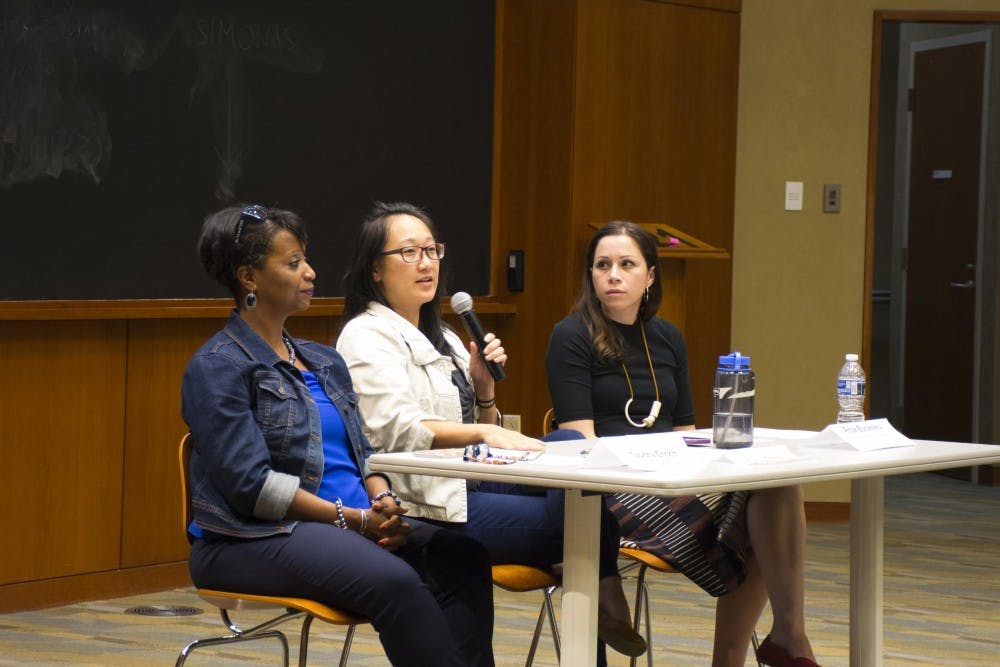The University Democrats hosted a panel on race and student activism during their meeting Wednesday night, featuring a discussion between Assoc. Dean of Students Tabitha Enoch, Asst. Sociology Prof. Rose Buckelew and Sylvia Chong, an associate professor of English and associate director of American Studies.
The panelists answered questions on the challenges of activism and how to navigate activism as a minority student.
In an email to The Cavalier Daily, Kiera Goddu, a third-year College student and vice president of the University Democrats, said each of the women brings a unique perspective to how race and student activism intersect at the University.
Enoch is focused on supporting students who are first-generation and low-income in her work in the Office of the Dean of Students. Throughout the discussion, Enoch said that it’s important for student activists to know the history of their movement at the University when organizing so that it can progress over generations.
“Changing the University is like trying to turn the ship around — it takes forever and a day,” Enoch said. “So I think planting the seeds is always important too. So as long as there's some sort of history, or someone recording what’s happened in the past, then you are planting seeds for other students who come after you.”
The panelists also discussed the extraction of emotional labor that students of color often perform on behalf of their white peers. Buckelew noted that white students have a responsibility to educate themselves on their history and how it impacts the experience of minority students at the University.
“I think you need to know the history of white supremacy at U.Va.,” Buckelew said. “I think that is your responsibility as a student at this school who is going to carry that degree out into the world.”
Chong spoke to her experience in American Studies, which includes U.S. Latinx and Asian Pacific American Studies minors, and said that student activism was crucial to stimulating discussion with administration about departmentalization, which would allow the program to hire its own faculty.
Last fall, the Latinx Student Association and Asian Leaders Council released joint open letters calling for increased institutional support for minority students, including a more diverse faculty.
Chong also said that it is important for student activists to consistently amplify and support one another, rather than only giving attention to minority causes when convenient for their own organization.
“I think sometimes, especially students of color or people of color, feel used,” Chong said. “Like, ‘you didn’t care about us, you came and mobilized the Asian American vote or the black women vote, and then whenever the elections were over I never saw you.’”
Goddu said that she hopes the panel explains the interaction between racial justice and other advocacy issues, and that there are different ways to demonstrate activism, beyond political involvement.
“I am hoping that UDems members and attendees who are not in our organization see the intersection of every single issue they care about and racial discrimination,” Goddu said. “I also hope that students see how electoral politics is not a stand alone solution to any of the problems that we face in our community and especially our university.”
For example, Goddu made note of Living Wage at U.Va., which rallied outside of the Board of Visitors meeting last March and called for a $16.84 living wage for University employees. President Jim Ryan announced the following week that full-time employees eligible for benefits will receive $15 per hour by Jan. 1. In their 2015 mission statement, Living Wage at U.Va. said “the devaluation of black lives is also structural: it is present in the continued denial of economic justice.”
First-year College student Zainab Jaffa said she attends most of the University Democrats’ events but was particularly interested in the panel held at this week’s meeting.
“I think most of the work we've done so far has been about campaigning, and I had yet to go to a meeting that wasn't ethnically sponsored that discussed racial issues,” Jaffa said. “So I was really eager to hear different perspectives on the subject and how it relates to the U.Va. experience as a whole.”





